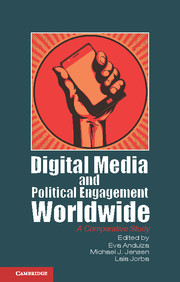Book contents
- Frontmatter
- Contents
- List of Tables and Figures
- Contributors
- Acknowledgments
- Introduction
- 1 The Impact of Digital Media on Citizenship from a Global Perspective
- 2 Recent Shifts in the Relationship between the Internet and Democratic Engagement in Britain and the United States
- 3 Political Engagement and the Internet in the 2008 U.S. Presidential Elections
- 4 Online Political Participation in the United States and Spain
- 5 Internet Use and Political Attitudes in Europe
- 6 Digital Media and Offline Political Participation in Spain
- 7 Online Participation in Italy
- 8 On the Causal Nature of the Relationship between Internet Access and Political Engagement
- 9 The Uses of Digital Media for Contentious Politics in Latin America
- 10 Opening Closed Regimes
- 11 Digital Media and Political Attitudes in China
- Conclusion
- References
- Index
1 - The Impact of Digital Media on Citizenship from a Global Perspective
Published online by Cambridge University Press: 05 July 2012
- Frontmatter
- Contents
- List of Tables and Figures
- Contributors
- Acknowledgments
- Introduction
- 1 The Impact of Digital Media on Citizenship from a Global Perspective
- 2 Recent Shifts in the Relationship between the Internet and Democratic Engagement in Britain and the United States
- 3 Political Engagement and the Internet in the 2008 U.S. Presidential Elections
- 4 Online Political Participation in the United States and Spain
- 5 Internet Use and Political Attitudes in Europe
- 6 Digital Media and Offline Political Participation in Spain
- 7 Online Participation in Italy
- 8 On the Causal Nature of the Relationship between Internet Access and Political Engagement
- 9 The Uses of Digital Media for Contentious Politics in Latin America
- 10 Opening Closed Regimes
- 11 Digital Media and Political Attitudes in China
- Conclusion
- References
- Index
Summary
Introduction
As new technologies are evolving worldwide, many theoretical challenges have arisen that surpass the frameworks used so far to pose questions about digital media and citizens’ lives. There is a great need for broader perspectives to understand what is common and what is different in emerging political practices across nations. That need motivates this chapter, which starts from the observation that a great deal of research on digital media and politics since the late 1990s has centered on one of two sets of issues. In the United States and the United Kingdom, and to some extent in other European countries, a central concern has been whether the use of digital media increases political participation or civic engagement. In research on authoritarian regimes, however, questions of censorship and state control over media have dominated the discussion. Although these two frameworks for analysis have been productive, they are ultimately quite limited in addressing the broad range of changes in the character of citizenship that is underway because of digital media.
The transformations associated with digital media extend well beyond how many people vote or how much content is circumscribed by state control. In many nations, both democratic and nondemocratic, the changes are similar or overlapping or common, whereas in others they differ because of political institutions and culture, or other aspects of political context, and as a result of different stages of internet diffusion. The goal of this chapter is to examine some common theoretical issues in digital media across nations as a framework for understanding citizenship practices in a broader way. We focus on five issues: political attitudes, political practices, sociality of politics, political voice, and transnational allegiance. In each, we account for some commonalities and differences across regimes.
- Type
- Chapter
- Information
- Digital Media and Political Engagement WorldwideA Comparative Study, pp. 16 - 38Publisher: Cambridge University PressPrint publication year: 2012
- 11
- Cited by



